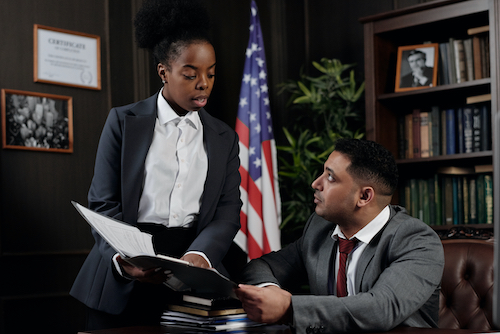
Connect with Family Law Attorneys
Scottsdale Divorce Lawyers
Divorce Deposition Tips
The divorce process has many steps, and depositions are usually one of those steps.
However, depositions can be challenging if you are not well-prepared. So, we put together a guide with tips to help you prepare for your divorce deposition.
We’ve also included examples of some of the questions you or the other deponents may need to answer.
BTL Family Law is here to help
What is a Divorce Deposition?
A divorce deposition is a sworn statement taken outside of a courtroom in front of a court reporter. During the deposition, the court reporter transcribes all of the questions and responses, creating a deposition transcript of the entire meeting.
The transcript includes any reports from the opposing attorney, as well as any deposition testimony.
Typically, depositions are held in the office of the attorney requesting the testimony, but they can also occur in other places, such as the court reporter’s office.
The individual being deposed is called the deponent. If the deponent is a party to the case, a subpoena is not required.
A Notice of Deposition, sent to the appropriate people, is sufficient. If the deponent is not a party to the case, a subpoena may be needed to compel the deponent’s attendance in addition to the Notice of Deposition.
Those summoned to a deposition may also be subpoenaed to bring or produce documents for review.

Witnesses may have to provide evidentiary documents before the deposition, or they may need to bring the materials with them.
Additionally, a deponent may still be subpoenaed to appear in court and testify after their deposition. Attorneys can use depositions as a way to gather testimony before actually going to trial.
They can get answers under oath about records received, expert-created reports, and other information before the case goes to trial. For example, if you are seeking spousal maintenance, an attorney may use information from the divorce deposition to evaluate your eligibility or ineligibility.
In Arizona, family law is somewhat restrictive of who can be deposed. Typically, the parties of the case and expert witnesses can be deposed. But, the rules provide for deposition of:
- Any party
- Any party’s current spouse
- Any person disclosed as an expert
- Any document custodian to secure the production of documents and establish an evidentiary foundation
Under the Family Law Rules of Procedure, no one outside the list above may be deposed unless the parties agree or the court orders it for good cause.
Have Family Law Questions? We Can Help
Preparing for a Deposition
The first step in preparing for a deposition is to give your attorney all of the facts. You can speak to your divorce attorney candidly because of your attorney-client privilege.
Giving your attorney important information, like background information of the deponent that the attorney would not normally know.

This can be helpful in the attorney’s preparation for the deposition and can help direct questioning.
If you are in the midst of a contentious custody case and/or the deponents do not get along, it may also be necessary for your legal counsel and the opposing attorney to develop a plan to ease any tension.
Any potential safety issues should be brought to your attorney’s attention so they can take appropriate steps towards safety.
You should also instruct anyone in your deposition to answer questions honestly.
Always tell the truth and don’t guess; if they do not know the answer to any deposition questions, they should simply state that.
Remember that the opposing attorney will have the opportunity to conduct a cross-examination. Anyone who lies during a deposition can be held legally responsible.
BTL Family Law is here to help
What Questions Are Asked at a Deposition?
One of the biggest questions regarding divorce depositions is what your spouse’s attorney will ask the deponents. The questions asked in a deposition differ from case to case.
We’ve detailed the most frequently discussed deposition subjects, but anything that pertains to your case could come up.
Your spouse’s lawyer may also ask you to complete interrogatories before or after your deposition.
Interrogatories are written questions from the opposing attorney that you answer under oath in writing. The questions may be similar to those asked during a recorded verbal witness statement.
Financial
Financial information is an essential aspect of divorce cases, especially when there is a division of property, assets, and debts.
If one or both parties believe the other is not forthcoming with information, a deposition may be necessary to give both sides more information and help them make crucial decisions regarding the financial aspects of the case.
The financial questions that could come up in a divorce deposition include questions about income, assets, debts, property owned by each spouse, and anything else that proves or disproves the spouse’s financial situation.
Financial documents are also frequently requested by the opposing party to make legal decisions in divorce proceedings, such as child support and spousal maintenance payments.

Child Custody
If you have minor children and have unresolved issues with child custody, your deposition could focus on matters relating to the children.
The divorce attorneys may ask a deponent the following questions: Who cares for the children? Where do they go to school? What is their home life like? How does each parent interact with the children? Are there any special needs the children might have? The deponent’s answers to these questions help inform the court before the judge rules on the final parenting plan.
Physical and Mental Health
If your physical or mental health is a matter of concern, you or the deponents might have to answer questions about how your health condition affects the case.
These questions could include information about how your health affects your ability to make decisions and care for matters relating to finances or your children.
If you have suffered from health issues in the past, you should disclose that information to your lawyer so if it is relevant to your case your attorney can prepare to address it.
Recreational Activities
Your personal life is not off-limits when it comes to a deposition. You or a deponent may have to answer questions about how you spend your free time and what activities you regularly engage in.
If you regularly engage in activities that are reckless or dangerous, it could be relevant to the divorce case. These include questions related to drug and alcohol use.
Ahead of the deposition, tell your divorce attorney of any recreational activities that may concern the court. Your attorney will be able to appropriately address those situations. Talking to your lawyer is better than your spouse’s attorney bringing it up first.
Living Situation
Depending on the type of marriage you have, your living situation may be relevant to the court.
For covenant marriages, you may need to answer questions about how long you and an estranged spouse have been living separately. Or, you may need to disclose information about your living plans after the divorce, so the court can decide if the environment is safe for children (if that is a concern).
Specific Events and Dates
If there are any specific events or dates that are crucial to your divorce case, they could come up in the deposition.
You need to make sure you tell the truth accurately and honestly because more than one deponent can answer the same question. If deponents give differing accounts, that could raise an issue with credibility for the judge.
Have Family Law Questions? We Can Help
Tips to Best Protect Yourself During a Deposition
Divorce depositions are very case-specific, so it is essential to work closely with your attorney and follow all legal advice they give you. Here are a few tips that can also help you protect yourself during a deposition.

Tip 1: Tell the Truth
It is best to be as truthful as possible during a deposition. Listen to the entire question before answering, and do not be afraid to say that you do not know the answer to an inquiry rather than guessing. Just answer the questions truthfully and move on.
What Happens If You Lie
There are laws in Arizona to compel deponents to tell the truth. These statutes make it illegal to perjure yourself.
So, if someone does give a false statement, there is a chance they could face criminal charges. At the very least, it will significantly hurt the deponent’s credibility with the court.
Tip 2: Talk To Your Attorney
Spend time discussing what to expect from the deposition with your divorce attorney.
Discuss with your attorney what they expect from the testimony. Do not be afraid to ask your attorney any questions you may have about the upcoming deposition.
Remember that your attorney-client relationship is there to protect you.
Tip 3: Understand What Your Attorney Can Do
Discuss what questions can be asked and what your attorney can do to help you during a deposition. There are minimal objections your attorney can make during a deposition, and, in almost all instances, even if your attorney objects, you are still required to answer the question.
It is essential to understand what your attorney can and cannot do, so you are not caught off guard during the deposition.
Tip 4: Prepare for the Environment
Try to be calm. Depositions can be stressful, and the environment makes many people nervous.
You are in the opposing counsel’s office, your ex might be there, and you are essentially the subject of a recorded interrogation. The best way to prepare for this is to prepare for the environment—adjust your mindset and body language accordingly.
The environment is often uncomfortable for the deponent, but you are just being asked questions about your case; it is not necessarily a bad thing.
While your attorney cannot stop you from having to answer questions, the questions asked will show you and your attorney where your spouse’s divorce lawyer is heading with their case.
It can provide great insight into the other side’s case and help you and your divorce attorney make important decisions.
Divorce Depositions can be Stressful
For the most part, depositions are just an afternoon of questions you must answer. It is very stressful for many people, but the truth of your case will come out eventually.
If there are things that come out in the deposition that you and your attorney need to handle, you can work on them.
Typically, you will have the time from the statement to the trial to gather whatever evidence you need to prove your claim and address any issue raised in the deposition.
However, while very limited, some things can be done to prevent certain information from being used in trial. This is why it is essential to work closely with a qualified family law attorney.
If you are supposed to attend a deposition and you need legal advice, contact us. We have years of experience resolving family law cases, and our law firm can handle all aspects of your Arizona divorce or child custody case.
BTL Family Law is here to help
Schedule a Consultation with a Scottsdale Divorce Lawyer Today
Take Control and Protect Your Future
The lawyers at BTL Family Law know that choosing the right divorce attorney is a personal matter. This is why you will never feel any pressure during your consultation. We are here to answer your questions, discuss your options, help you understand your rights, and, if we represent you in your divorce, our lawyers will guide you through every step of the process as efficiently as possible. We work to keep costs low so that you can start this new chapter of your life in the best position possible.
